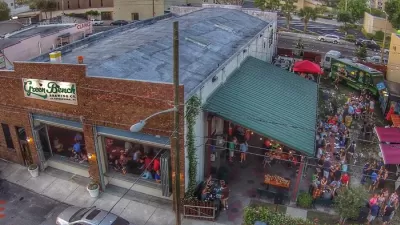Joel Kotkin thinks that the effects of the financial crisis may not be all bad, and may even encourage a new focus on family and community ties.
"This trend toward what I call "the new localism" has been underway for some years, driven by changing demographics, new technologies and rising energy prices. But the economic downturn will probably accelerate it as individuals and corporations look not to the global stage but closer to home, concentrating and congregating on the Main Streets where we choose to live – in the suburbs, in urban neighborhoods or in small towns.
In his 1972 bestseller, "A Nation of Strangers," social critic Vance Packard depicted the United States as "a society coming apart at the seams." He was only one in a long cavalcade of futurists who have envisioned an America of ever-increasing "spatial mobility" that would give rise to weaker families, childlessness and anonymous communities.
Packard and others may not have been far off for their time: In 1970, nearly 20 percent of Americans changed their place of residence every year. But by 2004, that figure had dropped to 14 percent, the lowest level since 1950. Americans born today are actually more likely to reside near their place of birth than those who lived in the 19th century. Part of this is due to our aging population, because older people are far less likely to move than those under 30. But more limited economic options may intensify this phenomenon while bringing a host of social, economic and environmental benefits in their wake."
FULL STORY: Turns Out There's Good News on Main St.

Planetizen Federal Action Tracker
A weekly monitor of how Trump’s orders and actions are impacting planners and planning in America.

Maui's Vacation Rental Debate Turns Ugly
Verbal attacks, misinformation campaigns and fistfights plague a high-stakes debate to convert thousands of vacation rentals into long-term housing.

Restaurant Patios Were a Pandemic Win — Why Were They so Hard to Keep?
Social distancing requirements and changes in travel patterns prompted cities to pilot new uses for street and sidewalk space. Then it got complicated.

In California Battle of Housing vs. Environment, Housing Just Won
A new state law significantly limits the power of CEQA, an environmental review law that served as a powerful tool for blocking new development.

Boulder Eliminates Parking Minimums Citywide
Officials estimate the cost of building a single underground parking space at up to $100,000.

Orange County, Florida Adopts Largest US “Sprawl Repair” Code
The ‘Orange Code’ seeks to rectify decades of sprawl-inducing, car-oriented development.
Urban Design for Planners 1: Software Tools
This six-course series explores essential urban design concepts using open source software and equips planners with the tools they need to participate fully in the urban design process.
Planning for Universal Design
Learn the tools for implementing Universal Design in planning regulations.
Heyer Gruel & Associates PA
JM Goldson LLC
Custer County Colorado
City of Camden Redevelopment Agency
City of Astoria
Transportation Research & Education Center (TREC) at Portland State University
Jefferson Parish Government
Camden Redevelopment Agency
City of Claremont



























